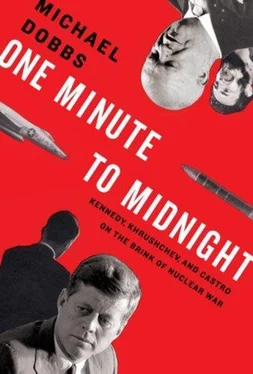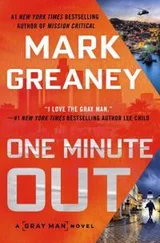“the children everywhere in the world”: O’Donnell and Powers, 325; WH gate logs and president’s phone log, October 27, 1962.
“an extra chicken leg”: O’Donnell and Powers, 340-1.
The evacuation instructions were part: Ted Gup, “The Doomsday Blueprints,” Time, August 10, 1992; George, 46-53.
“What happens to our wives”: O’Donnell and Powers, 324.
“succumbed to the general mood of apocalypse”: Brugioni, Eyeball to Eyeball, 482; “An Interview with Richard Lehman,” Studies in Intelligence (Summer 2000).
“never live to see another”: Blight et al., Cuba on the Brink, 378. McNamara says that he was “leaving the president’s office at dusk” to return to the Pentagon, but Sheldon Stern points out that it was already dark by the time the ExComm broke up: sunset came at 6:15 p.m. on October 27.
With Kennedy’s consent, Rusk telephoned: FRUS, Vol. XI, 275; Rusk, 240-1. Some scholars have questioned the reliability of Rusk’s 1987 account of the approach to Cordier, but it seems fully consistent with the thrust of the previous ExComm debate and JFK’s views on the Jupiters.
“Junta for an Independent”: State Department Coordinator for Cuban Affairs memo, October 27, 1962, JFKARC.
“I cannot run my office”: Miro profile, Time, April 28, 1961.
“I know something”: Reeves, 97.
kept at “maximum readiness”: Nestor T. Carbonell, And the Russians Stayed: The Sovietization of Cuba (New York: William Morrow, 1989), 222-3.
a “volatile, emotional”: CIA memo for Lansdale on Operation Mongoose—Infiltration Teams, October 29, 1962, JFKARC; see also Lansdale memo on covert operations, October 31, 1962, JFKARC.
“Friends simply do not behave”: Allyn et al., Back to the Brink, 149.
“He began to assess the situation”: Alekseev cable to Moscow, October 27, 1962, trans. in CWIHP, 8-9 (Winter 1996-97), 291.
His subsequent report to Moscow: Blight et al., Cuba on the Brink, 117. Alekseev said that he did not find out the truth about who shot down the plane until 1978.
“almost fell into the water”: Orlov interview.
“This ship belongs”: Ibid.
Lookouts reported that the Americans: Mozgovoi, 93; Carrier Division Sixteen, Cuban missile crisis documentation, NSAW.
“to throw off your pursuers”: Orlov interview.
Kennedy dismissed most: Salinger, John F. Kennedy, 125.
a “piece of ass”: Seymour Hersh, The Dark Side of Camelot (Boston: Little, Brown, 1997), 389. The need for sex was a recurring theme for JFK. He told Clare Boothe Luce that he could not “go to sleep without a lay.”
Mary telephoned Jack: White House phone records, October 27, 1962; WH social files, October 24, 1962, JFKL. Meyer’s many visits to the White House were usually noted by the Secret Service. There is no evidence that she met JFK on October 27. It is unclear whether he returned her phone call, as he was able to make local calls without going through the White House switchboard. For a discussion of their relationship, see Nina Burleigh, A Very Private Woman (New York: Bantam Books, 1998), 181-227.
“We’ll be going”: O’Donnell and Powers, 341.
George Anderson retired to bed: CNO Office log, October 27, 1962; OPNAV resume of events, CNO Cuba, USNHC.
to be “hostile”: Gilpatric handwritten notes from 9:00 p.m. ExComm meeting, October 27, 1962, OSD.
“Now anything can happen”: October 28 Prensa Latina report, FBIS, October 30, 1962.
CHAPTER FOURTEEN: “CRATE AND RETURN”
“You dragged us into this mess”: Troyanovsky, 250. For the time of meeting, see Sergei Khrushchev, Nikita Khrushchev, 351.
“the danger of war and nuclear”: September 1993 interview with CC secretary Boris Ponomaryev cited in Fursenko and Naftali, One Hell of a Gamble, 284; see Fursenko, Prezidium Ts. K. KPSS, 624, for Malin notes on Presidium meeting, October 28, 1962.
The possibility that Soviet commanders on Cuba: Sergei Khrushchev, 335. Sergei reports that his father angrily asked Malinovsky whether Soviet generals on Cuba were serving in the Soviet or Cuban army. “If they are serving in the Soviet army, why do they place themselves under a foreign commander?” Since Sergei was not present at this conversation, I have not used the quote. However, the sentiment appears to be an accurate reflection of his father’s views at the time.
the “hour of decision”: Troyanovsky, 251; Dobrynin, 88. Several writers have argued that Dobrynin’s report on his meeting with RFK arrived too late to influence Khrushchev’s reply to JFK. See, e.g., Fursenko and Naftali, Khrushchev’s Cold War, 490, which claims that Khrushchev “dictated his concession speech…before he knew of Kennedy’s own concession.” This is a misreading of the October 28 Presidium record. The minutes do suggest that a smaller group of Presidium members convened later in the day to consider the Dobrynin report, and reply to it. However, they list the Dobrynin report as number three on an agenda of at least nine items that day, ahead of a letter to Fidel Castro and a telegram to Pliyev (number five on the agenda), which were both part of the original discussion. Other Presidium records show that several agenda items were debated “out of order.”
It seems probable, therefore, that the Dobrynin message arrived during the first part of the meeting, before Khrushchev dictated his letters to JFK and Castro, but became the subject of detailed discussion at the second session. This is consistent with Khrushchev’s own memoirs and the memories of Oleg Troyanovsky, who was present at the first session. Together with the fragmentary Presidium record, Troyanovsky’s account is the most authoritative version of what took place, and I have followed it closely.
if he led them into a “war of annihilation”: Khrushchev letter to Castro, October 30, 1962, NSAW.
“Let none of you”: Gribkov et al., U Kraya Yadernoi Bezdni, 167.
had come to “deeply respect”: NK1, 500.
The Soviet people wanted “nothing but peace”: FRUS, Vol. XI, 279.
advised Castro to “show patience”: Khrushchev letter to Castro, October 28, 1962, NSAW, trans. by the author.
“We consider that you acted”: Malinovsky telegram to Pliyev (pseudonym Pavlov), October 28, 1962, 4:00 p.m. Moscow time. NSAW Cuba, trans. by the author. Malinovsky sent a further message at 6:30 p.m. Moscow time, ordering Pliyev not to use S-75 SAM missiles and to ground fighter aircraft “in order to avoid collisions with U.S. reconnaissance planes.” Translations of both documents are in CWIHP, 14-15 (Winter 2003), 389.
“a long wire” or rope: CINCLANFLT message 272318Z, CNO Cuba, USNHC.
“Korabl X”: Log books of USS Beale, Cony, and Murray. See Submarine chronology prepared by NSAW.
“Attention, attention please”: Carrier Division Sixteen, Cuban missile crisis documentation, NSAW.
to “behave with dignity”: Mozgovoi, 94; Orlov interview.
“The only thing he understood”: Dubivko memoir, “In the Depths of the Sargasso Sea,” trans. Savranskaya.
“It’s a disgrace”: Mozgovoi, 109-10.
“enjoyed ridiculing people”: Gen. Horace M. Wade OH, AFHRA.
“Shit, oh dear!”: Unpublished Maultsby memoir.
“demonstrated the seriousness”: Sagan, 76.
“You are a lucky little devil”: Exactly how Maultsby came to overfly the Soviet Union, and the precise route he took on his way to and from the North Pole, would remain mysterious for many decades. Although the U.S. government admitted to a “serious navigational error” by the pilot that took him over Soviet territory, it did its best to hush up the embarrassing incident. McNamara demanded “a complete and detailed report” on what went wrong, but the results of the Air Force investigation have not been released. (McNamara memo to Air Force secretary, Cuban missile crisis files, Box 1, OSD.) Among the few official documents that this author was able to find relating to the incident were two charts showing Maultsby’s route over the Soviet Union. The charts turned up in unexpected places in the records of the State Department and the JFK Library, suggesting that they may have been declassified inadvertently.
Читать дальше












